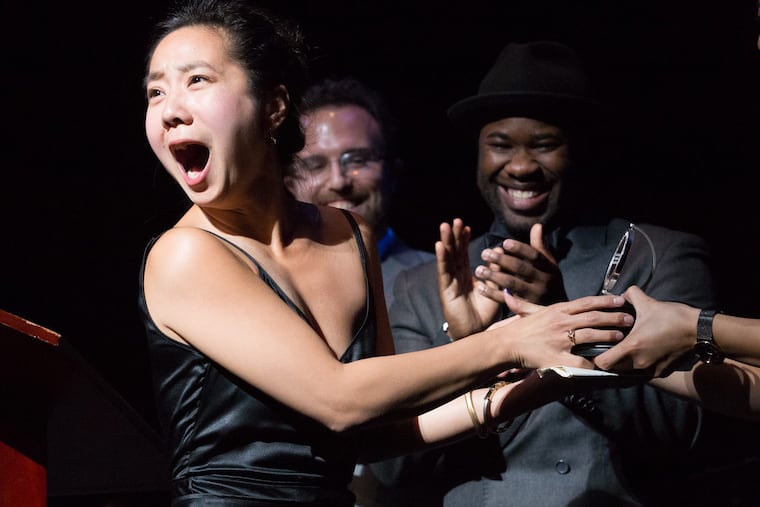Barrymore Awards are going gender-neutral
The Barrymores, "Philly's Tony Awards," are going gender-neutral. Theatre Philadelphia, which administers the awards, is also working to diversify the ranks of the people who pick the winners.

The Barrymore Awards – sometimes called "Philadelphia's Tony Awards" – are changing. Starting now, they will be more inclusive, to reflect the makeup of the local theater community, and to respond to criticism that the Barrymore Awards process lacked diversity.
>> READ MORE: After an 'OscarsSoWhite' kind of Barrymores, Philly theater questions the best way to be inclusive
On Tuesday, Theatre Philadelphia, which administers the Barrymores, announced it was switching to gender-neutral awards. Instead of a best actor and best actress, there will now be awards for best performance in categories that used to be gender specific, and two awards will be given.
So there will, for example, be two awards for best performance in a musical, two for best performance in a play, two for best supporting performance, and so on — the idea being to open up different combinations of male, female, and gender-nonconforming awardees.
These changes will be in effect when the Barrymores for the 2017-18 season are given out in the fall.
"We're in good company," said Leigh Goldenberg, executive director of Theatre Philadelphia. "We've been talking to theater groups across the company and in Canada, several of which have just made changes in their awards to be more inclusive."
Theatre Bay Area in San Francisco was first, going to gender-inclusive awards in 2017. The Chicago "Jeff" awards announced nonbinary categories (categories not limited to male or female) in April.
Early reaction from the Philly theater community was enthusiastic. James iJames, who won a 2013 Barrymore for directing, called the changes "fabulous and smart." Playwright Jacqueline Goldfinger said, "Today's Barrymore announcement made me very hopeful."
"No gold star for doing something that could have been done long ago," said performer/writer/educator Jennifer MacMillan, who wrote an essay last year in the Broad Street Review calling for change in the Barrymores. "These are not huge, difficult changes but matters of simple fairness."
Theatre Philadelphia also is continuing to diversify the ranks of its 76 nominators, who visit plays and recommend them for eligibility, and 12 judges, who choose finalists and winners. "The most notable change is in the group of judges," Goldenberg said.
Half of selected judges this year identified as people of color, going from two to six. Ten of the 12 are women, compared to six women and one gender-nonconforming judge last year.
Among nominators, 44 percent identified as people of color, a 7 percent increase from 2017, when Theatre Philadelphia made a first effort to diversify that group.
Theatre Philadelphia started its diversity push after the 2016-17 season, noting a preponderance of straight white men among judges and nominators. Orientation for the new, more diverse groups took place on Monday, and a list of all nominators and judges appeared in the Tuesday announcement.
Last year's Barrymore Awards were criticized for not being significantly diverse, with only 10 percent of nominations going to people of color.
>> READ MORE: Full list of 2017 Barrymore Winners
Those nominations, and the awards that followed, prompted a discussion of diversity in the theater community. Asked whether that controversy spurred the revamp of categories, Goldenberg said, "Certainly. It's up to us to be reflective of our community. And our system is flexible and can respond nimbly to changing times.
>> READ MORE: No more Outstanding Actor: Goldenberg explains the changes to the Barrymore Awards | Perspective
"I recognize, with a great sense of responsibility, that there are some concrete, visible things we can do to address the issue. Other, greater issues are at play in the world at large that may favor one group or another, and I hope this leads to a larger discussion of that. Who are we hiring as actors, set designers, producers? How can we be more aware of our choices and keep inclusion uppermost?"
Judges meet quarterly to discuss the awards. In July, they will meet to choose a final slate of nominees. When those are announced in August, the judges will again meet and choose winners, who will receive the awards in the fall. The time and place of the awards gala has not yet been announced.